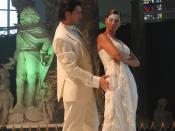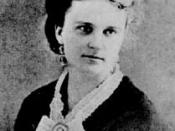Response To "The Story of an Hour" Kate Chopin's "The Story Of an Hour" appears to explore a woman who undergoes an unpredictable reaction to her husband's assumed death and reappearance, but actually Chopin offers this deception of a marriage that stifles the woman to the point that she celebrates the death of her husband. Chopin challenges her readers to examine their own views of marriage and relationships between men and women. Each reader's judgment of Mrs. Mallard and her behavior inevitably stems from his or her own personal feelings about marriage and the influences of religious beliefs, and societal expectations. Readers of differing genders, ages and marital experiences are, therefore, likely to react differently to Chopin's starling portrayal of the Mallards' marriage.
Marriage is often thought of as two people bounded by love and happiness, but in reality a life long of love and happiness isn't always the case.
Divorce or separation is usually the solution to a disastrous marriage. Chopin explores a marriage that doesn't turn to divorce or separation as a way out from an unhappy marriage; instead, they follow and live by their vows. When Mr. and Mrs.Mallard wedded, one of their marriage vows were "till death do us part". Something that both Mr. and Mrs.Mallard believed in strongly. Their marriage was based on their love for each other, but through time their love for each other slipped away and their happiness was lost at the same time. Soon both couples where unhappy with each other, which is obviously shown when Mrs. Mallard celebrates the death of her husband and states, "free, free, free!" Also when she describes Mr. Mallards face as, "the face that never looked save with love upon her", meaning he never showed or expressed his love to her as he once did at the beginning of their marriage. Both Mr. and Mrs.Mallard were miserable with each other, but because of their marriage vows and their strong belief in it, they were stuck being together forever. Neither couple believed in divorce otherwise, they would of left instead of staying prisoner by marriage.
The main character, Mrs. Mallard goes through an unpredictable reaction of her husband's death and reappearance. When she hears the news that her husband was killed in the train wreck, she was immediately overwhelmed with sadness, but as she laid in her chair overlooking out her window a sudden realization came over her as she said, "free, free, free!" What was she free from and why was she so happy about being free? At first Mrs. Mallard is grief stricken when told about her husband's death, but as she sat in her chair overlooking out her window she saw at a brief moment in time her freedom. From her window she saw "new spring life", in her mind a new beginning to her own life. It was as if she was born again, set free once again on her own. In her mind she saw freedom from a man that didn't love her as much as she loved him. She was finally free from a situation she thought she would be stuck in for the rest of her life.
When Mrs. Mallard finds out that her husband was killed her first reaction was grief, but soon she came to the realization that she wasn't a prisoner by marriage anymore. As she stated to herself "free, free, free!" Mrs. Mallard believed she was free from her husband, but when she saw him walk into the house, her hopes of being free was demolished. She was so overwhelmed by his unexpected reappearance that she died of a heart disease of "joy that kills". Mrs. Mallard was so happy when she came to the belief that she was free, but when she soon found out she wasn't, that her husband was still alive, the only way she could find peace and happiness was through her own death. Literally, her own joy had killed her because the only way she would accomplish being free was in her own death.
Although Mrs. Mallard celebrated her husband's death, she knew she would cry again when she saw her husband lying lifeless in his casket. Her crying would both compose of sadness and happiness at the same time. She would be sad that she lost a man that she once shared a life long dream of loving and being happy together. Her happiness would come from a new beginning she would start on her own, a happiness she longed to feel and have once again. Most readers see Mrs. Mallard as selfish and cold hearted because she ecstatically revels in her newly discovered sense of freedom so soon after learning of her husband's presumed death. Others read her as a victim of her inability to control her own life because of religious factors pertaining to a vow "till death do us part", which did follow her to the end.





